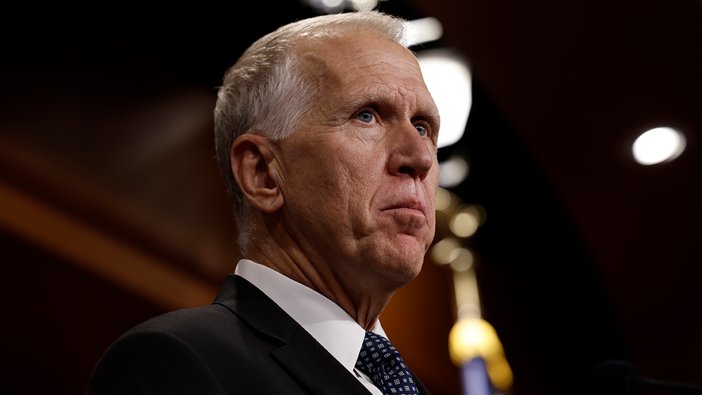
Tillis Defies Trump on Medicaid, Senate Bill Advances
Sen. Thom Tillis opposes Trump’s “big, beautiful bill” over Medicaid cuts, risking GOP unity as Senate advances key vote.
Senator’s Defection Puts Trump Bill at Risk
Senator Thom Tillis, R-N.C., broke with his party and President Donald Trump this weekend, refusing to support the administration’s sweeping “big, beautiful bill” due to concerns about steep Medicaid cuts that could cost North Carolina up to $40 billion in funding. Tillis’s public opposition triggered both intraparty drama and direct threats from Trump to support a primary challenger in the 2026 election cycle.
Tillis, who is up for reelection in 2026, explained after a closed-door GOP lunch that while he maintains good relationships with his colleagues, he could not endorse the legislation. “We just have a disagreement,” he said. “It’s not a good impact in my state, so I’m not going to vote on the motion to proceed.” He also said he would oppose the bill at the final passage, despite ongoing discussions with the president and party leaders.
Senate Advances Bill Despite GOP Divisions
After hours of high-stakes negotiations, Senate Republicans narrowly passed a crucial procedural vote, 51-49, to move the bill forward for a marathon session of amendments and debate. Tillis and Sen. Rand Paul, R-Ky., were the only Republicans to vote against the measure. Sen. Ron Johnson, R-Wis., initially opposed but switched his vote in a dramatic last-minute move, while Vice President JD Vance was on hand for a potential tie-break but was not needed.
Majority Leader John Thune, R-S.D., faces a difficult path with only a three-vote margin. Further complicating the process, Sen. Susan Collins, R-Maine—also up for reelection in 2026—signaled she would support the procedural step but was leaning against final passage unless additional changes are made. Concerns about Medicaid provider tax rates, rural hospital funding, and other elements prompted late-night modifications, including a one-year delay on provider rate changes and an extra $25 billion for rural hospital stabilization.
Despite these adjustments, Tillis remained opposed, warning that the changes would still severely impact North Carolina. He plans to release further analysis that he claims no one in the administration has been able to refute. “If this works for the country, that’s great. But we just have a disagreement based on the implementation in our respective states,” he said.
Trump Escalates Intraparty Tensions
President Trump responded to Tillis’s defection by publicly threatening to back a primary challenger. “Numerous people have come forward wanting to run in the Primary against ‘Senator Thom’ Tillis,” Trump wrote, promising to meet with prospective challengers. Trump also criticized other GOP dissenters, including Rand Paul, on social media. The White House, in a statement of administration policy, warned that failure to pass the bill would be the “ultimate betrayal.”
As the bill moves into an intense amendment “vote-a-rama” and faces delays from Democratic procedural tactics, its ultimate fate remains uncertain. Party leaders must secure near-total unity to send the package to Trump’s desk by July 4, as Republican moderates and hardliners alike leverage the remaining debates to press for further changes.
The showdown highlights the deep divisions within the GOP over health care spending, state funding, and the limits of party loyalty—issues that could shape both the future of Trump’s agenda and the political landscape heading into 2026.






